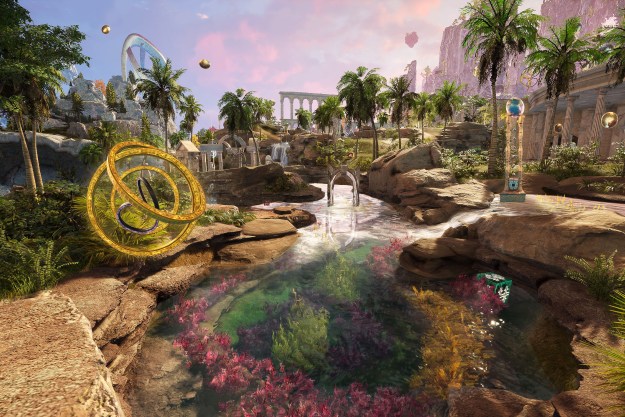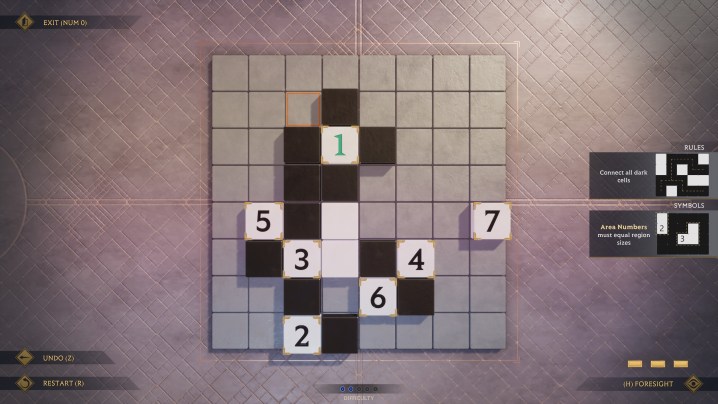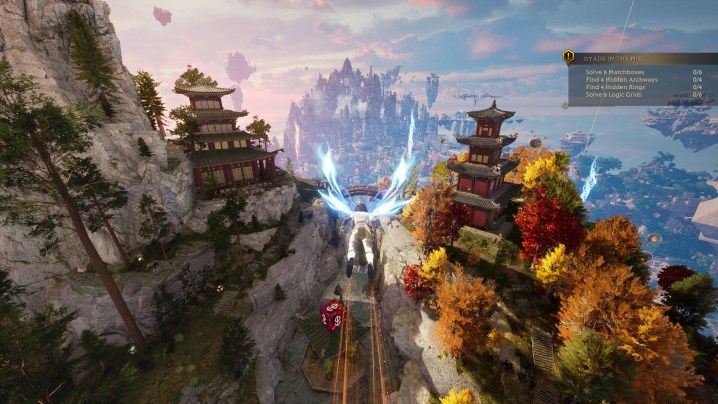
“Islands of Insight is the modern reinvention the puzzle genre needs.”
- Tons of fun puzzles
- Near infinite challenges
- Smart progression hooks
- Great co-op integration
- Some dud formats
- Repetitive grid puzzles
- Meandering lore
When I was a kid, my most prized possession was my subscription to World of Puzzles magazine. Every month, I’d get a physical issue filled to the brim with puzzles that would keep me occupied until my next delivery. I’d become obsessed with certain puzzle formats, like its unique spin on cryptograms and crosswords. Others were total duds that I’d skip over every time, but that was fine. All that mattered was that I had a consistent way to exercise my brain.
Islands of Insight captures that exact feeling in a way few games ever have. The unique project from Dead by Daylight publisher Behaviour Interactive takes the concept of a newspaper puzzle page and spreads it across an open world filled with thousands of puzzles. As soon as I jumped in, I found myself in a familiar flow. Some puzzle had me exploring every end of a massive sky island to find more problems to solve, just like I’d flip through every new World of Puzzles issue to find the few formats I liked. And a few others had me groaning every time I came across them.
That mixed experience might be off-putting to those who feel compelled to solve every problem they see, but Islands of Insight offers an enormous open-world puzzle book that’ll keep your brain sharp for a very long time.
Open-world deconstruction
Islands of Insight is best described as an open-world genre deconstruction. Imagine a game like Assassin’s Creed Valhalla, but with all its story and combat removed. Instead, picture what it would look like if you were simply left with its massive explorable map filled with little world activities to solve. That’s exactly what Islands of Insight delivers, and it almost plays like a modern version of Myst.
Taking clear cues from The Witness, Islands of Insight tosses players into an atmospheric open world densely dotted with puzzles. Though rather than riffing on one single puzzle type, it delivers a wide range of formats that are often bite-sized in nature. Some of those are very traditional, like grid problems that have players correctly filling in black and white boxes using varying rule sets. Others are small observational challenges that are naturally integrated into the world. In the first area alone, I’d hunt down five objects in a domed-off area, find and connect two symbols within view of one another, and walk through an invisible archway.

What works so well here is just how quick and densely packed in a lot of these puzzles are. No matter where I am on the island, I’m always surrounded by a handful of puzzles that I can quickly ping-pong between. Some only take a few seconds to solve, like lining up a hidden pattern painted on the environment or looking through interlocked rings and clicking on the point where they all intersect. Even if I only have a few minutes to pop in, I can usually solve a dozen puzzles in that time.
Developer Lunarch Studios seems to be going for quantity over quality here, packing in what feels like an infinite number of puzzles. That approach has its upsides and downsides. While there are plenty of formats here that I enjoy, there are several duds in the batch. One irritating type has me trying to line a photo of the environment up with the real world correctly, while another has me struggling to realign a psychedelic mosaic to recreate a specific pattern. Others aren’t so much puzzles as simple traversal challenges that ask me to touch a bunch of blue orbs within a time limit.
I feel like I have a near-infinite number of problems to tackle.
Though I do enjoy that there are so many bite-sized challenges, there is a lack of more traditional puzzles that escalate in difficulty. That’s mostly just found in grid puzzles, which start to get repetitive even with some cleverly shifting rules. More creative variants have me recreating sounds by properly filling in squares like I’m sequencing a beat pad. Another has me looking at the environment to find a hidden solution in the world. Twists like that help diversify the puzzle offering, but filling in black and white boxes does start to feel old after doing it hundreds of times.
That’s where the sheer number of puzzles helps matters. The world is so tightly packed with little challenges that I can ignore three or four formats entirely (aside from a few challenges that need to be completed to progress the “story”) and still feel like I have a near-infinite number of problems to tackle. Islands of Insight reminds me of a modern World of Puzzles in that respect; it’s a digital magazine with enough pages that I don’t feel bad skipping a few here and there.
Progression in puzzles
A massive open world loaded with puzzles is a novel concept, but the real trick is finding a way to make that problem-solving feel meaningful. Islands of Insight takes several stabs at that challenge with varying degrees of success. What doesn’t work is its loose story, which boils down to a lot of philosophical meandering in vague lore logs. Think The Talos Principle 2 with less concrete worldbuilding.
More enticing is its approach to progression, which keeps loose puzzle-solving rewarding throughout. The core hook is that I need to collect items called Mirabalis to unlock more parts of the island. Those are gained through specific challenges dotted around the world, as well as on self-contained islands that almost act as “dungeons.” That collection loop is enough to get players through over a dozen hours of playtime just to see the whole world, though it’ll also force them to complete certain puzzle types they detest to progress the game.
I’m always unlocking something or progressing my character in some way …
What’s more effective are its RPG-adjacent hooks. The more puzzles players solve, the more currency they get that can be spent on a skill tree. That unlocks more traversal options that let players glide around the islands, as well as bonus rewards for completing specific puzzle types. Players level up throughout the adventure too, netting them cosmetic rewards that can be used to customize their character. Each of those systems come together to make me feel like I’m always unlocking something or progressing my character in some way even when I’m completing random puzzles off the mainline path.
Its biggest ace in the hole, though, is a co-op hook that really makes Islands of Insight special. Friends can explore the island together, solving puzzles or splitting up and tackling challenges on their own. At first, I worried about how that would work. Why would I want someone else solving my puzzles? But that’s another area where the sheer mass and diversity of challenges goes a long way. If there’s one puzzle format I hate, perhaps I have a friend who’d be willing to tackle that. And when late-game grid puzzles get really tough, it can help to have a buddy around for their brain power.

It all makes Islands of Insight feel like the kind of forward-thinking approach to the genre that gaming needs. While the indie puzzle scene is busy and vibrant, it’s a genre that major studios have largely abandoned over the years. The genre has increasingly become out of step with modern trends like open-world design, RPG progression, multiplayer, and MMO-like hooks meant to keep players engaged longer. Islands of Insight proves that those ideas aren’t entirely incompatible with a puzzle game, and that’s perhaps its most important solution.
Islands of Insight was tested on PC.




